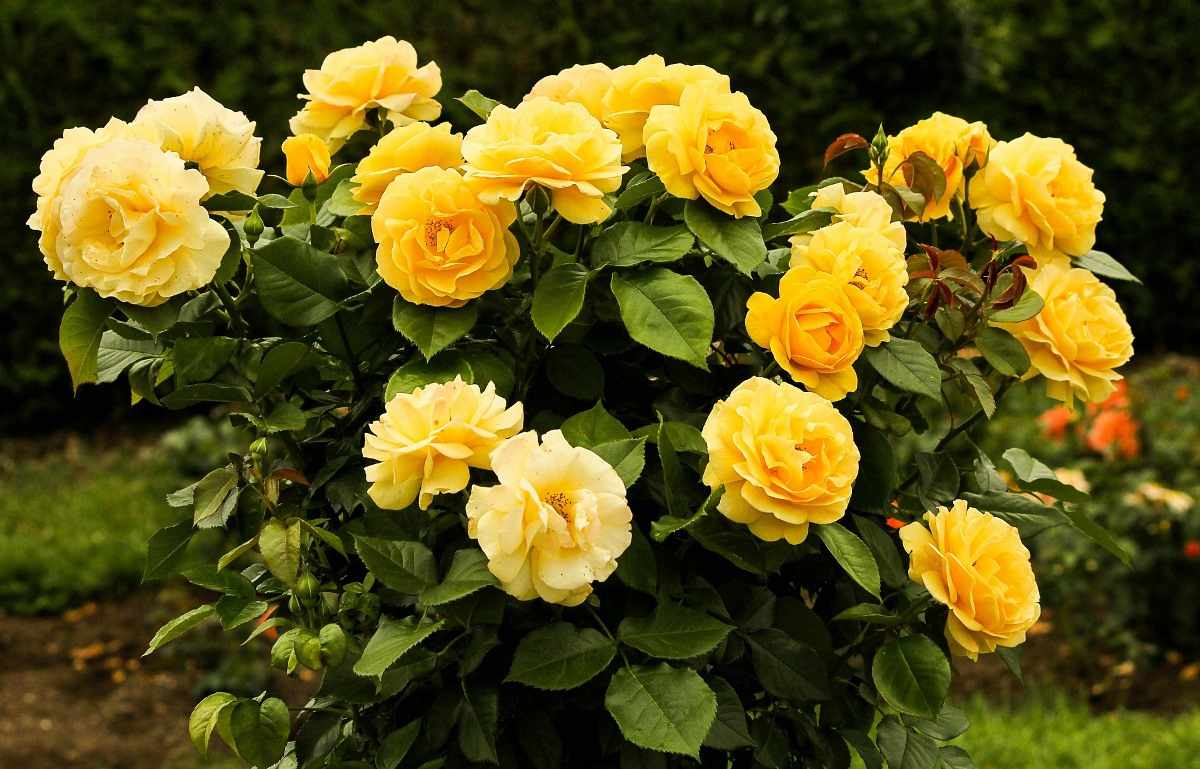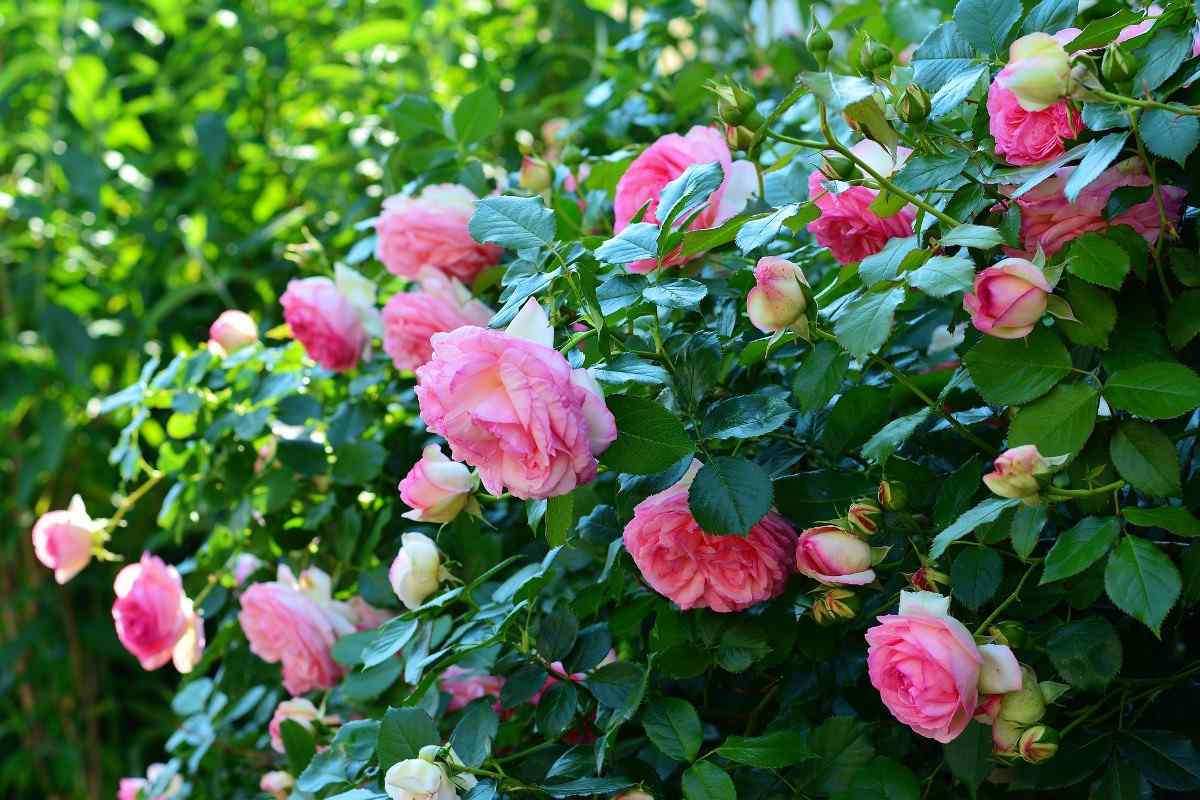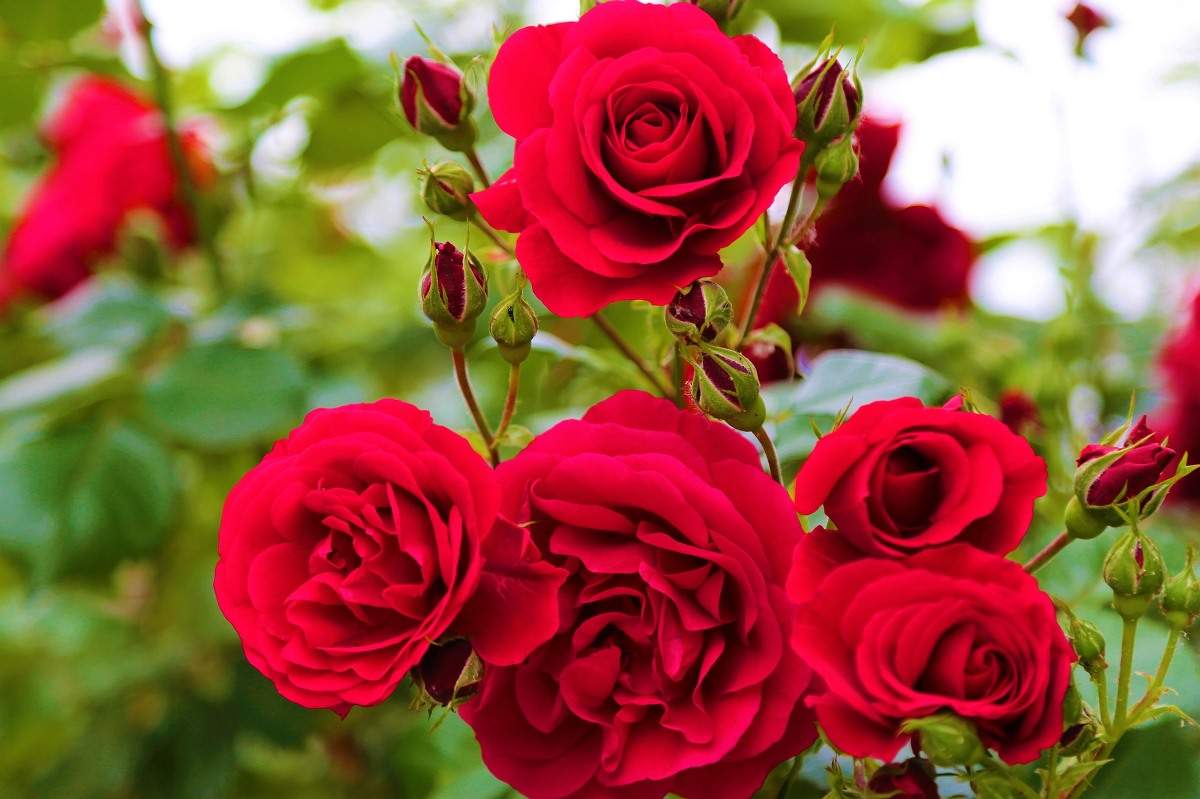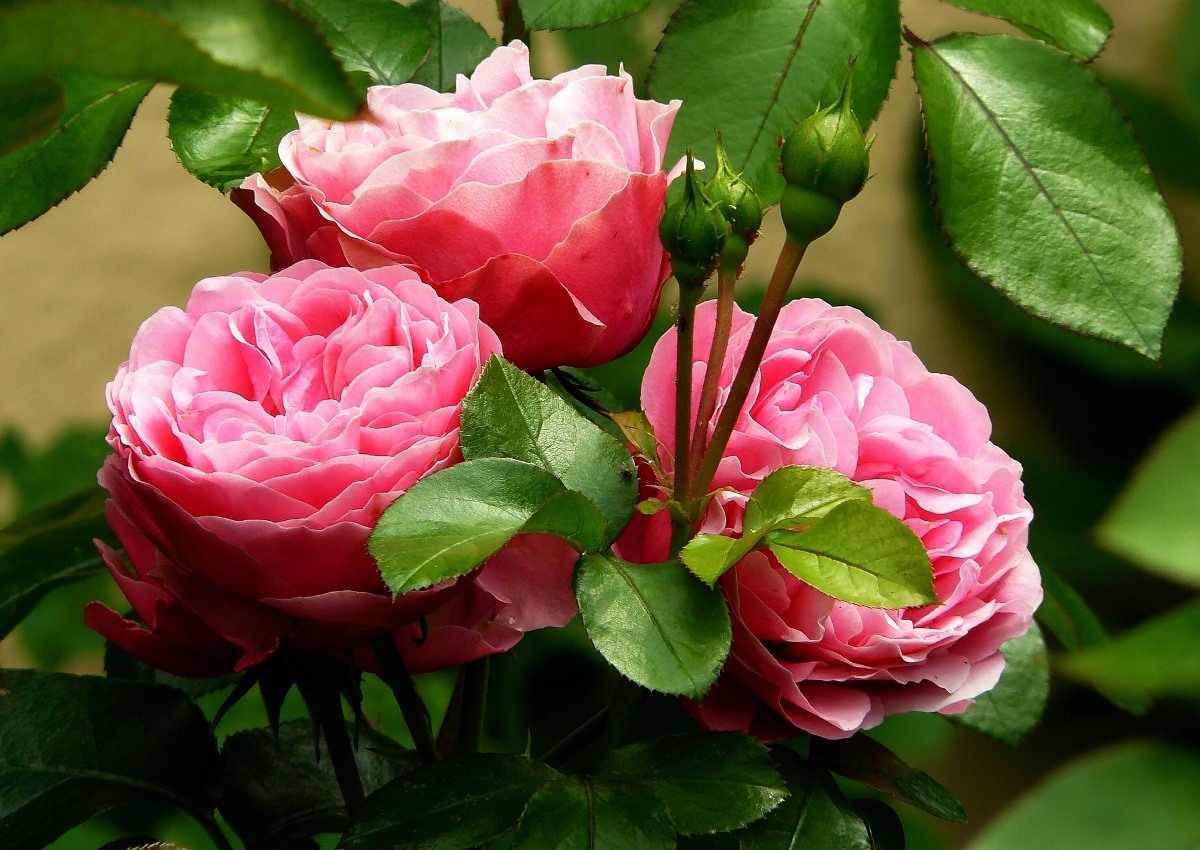Organic fertilizer for Rose plants to boost branching and flowering
Roses are among the most beautiful of all garden plants, but they take up a lot of space in the garden. Plant your organic Roses in a sunny location with good drainage. Fertilize them regularly for impressive flowers. Water them evenly to keep the soil moist. Prune established Rose bushes in early spring. Watch for diseases like powdery mildew or black spot. Growing beautiful Roses requires care and lots of nutrients. You can grow your Roses best with a food balance that’s high in nitrogen, phosphorus, and potassium, as well as some secondary nutrients and minerals.
A step by step guide to organic fertilizer for Rose plants
Roses even when neglected, but an application of fertilizer helps plants grow healthy roots and colorful blossoms. Synthetic fertilizers give Roses the nutrients they need, but overfertilizing may result in leaf burn or rapid growth that can attract pests. Homemade fertilizers contain organic or natural ingredients, and they break down more slowly than chemical fertilizers. Making homemade fertilizer also allows the gardener to recycle kitchen scraps that would otherwise be discarded.
Nutrients that Roses need;
The primary nutrients (macronutrients) that all plants require are nitrogen (N), phosphorus (P) and potassium (K).
- Nitrogen encourages healthy, vigorous leaf growth. Since Rose’s ability to make flowers resides in its leaves, healthy foliage results in more flowers. Too much nitrogen will result in too much foliage and fewer blooms, while not enough nitrogen results in yellow leaves, stunted growth and smaller blooms.
- Phosphorus promotes healthy root development and abundant flower production. A shortage of phosphorous can result in leaf drop, weak flower stems, and buds that won’t open.
- Potassium is also referred to as potash, helps Roses recover when stressed by insect and disease damage, or by extreme weather conditions. Lack of potassium can result in yellow leaf margins, weak flower stems and poorly developed buds.

Other nutrients – To thrive, Roses also need micronutrients including calcium, magnesium, sulfur, boron, copper, iron, manganese, and zinc.
Conditions for planting Roses in containers
- When it comes to choosing a pot for container Rose gardening, size matters and bigger is better. Roses have extensive root systems and a standard-size Rose should be planted in a container in the 8 to 15-gallon size range. The pot should be big enough to accommodate the root ball of the plant, plus offer room for growth. A large container also holds more soil volume and dries out less frequently than a smaller pot, which means less watering for you.
- Now that you’ve found the perfect Rose and picked your container, it’s time to plant. Start by mixing a high-quality potting mix with compost or aged manure. Roses require rich soil, but they also need well-draining soil. Therefore, the compost and potting mix combination are ideal for container Rose gardening. Aim for a ratio of two-thirds potting mix and one-third compost. At this time, a slow-release granular Rose fertilizer can also be added to the soil.
- Scoop the soil mixture into the container until it is around two-thirds full. Remove the plant from its container and use your fingers to gently loosen the rootball. Slightly mound the soil in the middle of the container and place the Rose on top of the mounded soil, spreading out the roots. Add more of the soil mixture until it’s even with the top of the root ball. Gently firm the soil around the rootball, adding more of the potting mix-compost to bring the soil level back up to the top of the rootball.
- After planting, give the container a deep drink of water and mulch the soil surface. A two-inch layer of natural bark mulch helps the soil hold moisture and reduces the need to water.
What is the best organic fertilizer for Rose plants?
Organic fertilizers, which are derived from plant or animal matter, are better for the environment. These have different nutritional advantages and can be used alone or in combination as part of your Rose-feeding regimen. Some also improve soil texture and support beneficial microbes.
Inorganic fertilizers (synthetic, chemical, or man-made) are ready-to-use and convenient, more concentrated and often less expensive than organic. However, these products don’t improve soil and have no positive residual effect. Some also contain insecticides and should be avoided altogether, as they can harm wildlife.
How to apply organic fertilizer for Rose plants?
- Before you even begin to fertilize your Rose plants, you need to conduct a pH test on your soil. Roses have a particular taste in soil (around 6.0 to 6.5) and don’t grow well if the level goes above or below. Start by fixing the pH level of your soil before tackling the fertilizer part.
- When fertilizing Roses, you want to be careful to switch up fertilizers now and then. If you start with a dry mixture, use it for about two to three weeks before switching to a liquid one. Similarly, switch to granules after some weeks have passed.
- This reduces unwanted salt in the soil and keeps the soil and Rose’s fresh and light. A good thing to note here is that young Roses don’t respond well to granule fertilizer. Start them off with a liquid to get them strong, and then introduce other fertilizer types.
Best time to fertilize Roses
Roses are considered difficult to manage because of their fertilization timetable. They are very hungry plants and take a lot of nutrients to grow strong. Yet, they don’t need much effort in terms of physical labour.
As Roses grow through winter, you want them to have the nutrients they need to survive the harsh season. Apply fertilizers with little nitrogen content during fall, so their roots get stronger. This ensures that they’ll carry on through winter and appear strong in spring.
After winter, you need to fertilize again during spring. The best time to fertilize your Roses is when spring has set in for a few weeks. If day temperatures are 15 to 21°C and the night’s stay in the upper 40°C, it’s a good time to introduce the fertilizer.
Although we use spring as a time placeholder, it depends on the weather and your Roses’ state. When you notice that you have 4 to 6 inches of new growth, add in some fertilizer. This should produce strong, fresh blooms in the warmer days.
Fertilizing container Roses – Roses are heavy feeders and container-grown Roses require special attention in regards to fertilizing. During the growing season, a monthly dose of liquid organic food, like fish emulsion, can help keep flower production high.
How to feed organic fertilzier for Rose plants for more blooms
You should not miss this: How To Grow Money Plant At Home.

- To care for Roses and keep Roses blooming, again and again, you should fertilize them about every 4 to 6 weeks, although the type of fertilizer you use may alter this rule a bit. Always follow label instructions when determining how much fertilizer to use. You don’t need to fertilize Roses that bloom only once in spring as often as repeat bloomers.
- First in spring, once new growth unfurls, and then after each flush of blooms about every 2 to 3 weeks. In colder zones, stop fertilizing 8 weeks before the first frost. Always use a fertilizer that begins as a liquid in the bottle, such as Founder’s Fish Fertilizer for the first year. Use of granular products in the 1st year may burn the roots and void our warranty.
- When you place a Rose within a finite amount of soil in a pot, it can quickly use up all of the nutrients available. Roses are heavy feeders in any situation, but when grown in pots they require more frequent feeding than when planted in the garden.
- Apply a balanced fertilizer designed for Roses every other week to make sure that your plants have access to all of the food they need for proper growth and vigorous blooming. Any balanced fertilizer works fine for Roses; those marketed as “Rose fertilizers” or “systemic Rose care” may have additional ingredients aimed at preventing fungal diseases or pests. In spring, some growers spread a tablespoon of Epsom salts around the base of the plant, which provides magnesium for healthy foliage.
- Apply fertilizer to the soil and not the leaves because foliage can be burned by the salts in fertilizers. You should stop fertilizing about 8 weeks before the expected first winter frost. This will prevent the plant from developing tender young shoots that will be destroyed by the frost.
Rose fertilizer and remedies available in your kitchen
For an impressive show of flowers, a Rosebush needs to be fertilized regularly. Organic methods provide a slow, steady supply of nutrients. Monthly applications of compost, composted manure, and other organic and natural fertilizers, such as this organic fish emulsion, work well. Organic amendments also help to encourage beneficial soil microbes and a well-balanced soil pH value. Slow-release fertilizers supply the right balance of nitrogen, phosphorus, potassium, and other minor nutrients. They also give Rose bushes the nourishment they need for optimum growth.
In case if you miss this: Growing Bonsai Trees In Containers.

For newly planted bare-root plants: Apply organic amendments to the soil at planting time. Wait until after the plant produces its first blooms to apply full-strength fertilizers so you don’t burn the new roots. Some of the home remedy fertilizers for Rose plants can be given below;
Used Tea Bags or Leaves
Roses love the Tannic acid that naturally occurs in Tea leaves. It’s a great idea to use used tea leaves or tea bags to fertilize your Roses. Tea leaves also make the soil porous and create a favorable environment for the growth of Rose bushes.
Egg Shells
This is one of the best organic fertilizer for rose plants for great health. Eggshells are a great source of calcium. Calcium helps to strengthen plant cells and block pathogens from entering the plant body. Calcium also helps strengthen the roots of plants allowing them to absorb more nutrients from the soil. Besides nitrogen and potassium, Roses require large amounts of calcium to grow well.
Since eggshells are slow to decompose in their original state, it is best to crush them into tiny pieces and incorporate them into the compost or soil. Before you do that though, make sure to wash and dry them thoroughly. Otherwise, pathogens from the eggs might get added to the soil causing more diseases.
Banana Peel Fertilizer
This organic fertilizer for rose plants works like a miracle. Ripe banana peels are a valuable addition to your Rose fertilizing regimen. Roses require potassium and banana skins consist of this mineral. And since they decompose easily, they rapidly release valuable minerals such as sulfur, potassium, calcium, magnesium, as well as trace elements into the soil. Grind all these into a smooth paste and apply this around your Rose bushes. There is a substantial amount of potassium in the banana peel. Burry the banana peel down in the soil. This will improve the overall growth of plants and help the plant to produce more flowers.
Fish Aquarium Water
If there is an aquarium in your house, then you must be changing its water at least once a week. Rather than throwing this water, use it for watering the Rose plants.
Apple Cider Vinegar
Both white vinegar and apple cider vinegar work to lower the pH of the soil and thus boost the growth of acidophilic plants like Roses. Just keep in mind, that vinegar lacks nutrients, and adding it alone regularly in large amounts can have harmful effects on your plants.
Rose plants are prone to black spot disease, especially if you live in warm humid climates. It’s a disease that afflicts most Rose varieties, spreads quickly, and is quite hard to get rid of. If you start to notice yellowing of the leaves and small black dots on the leaves and the stems, your plant has most likely caught the fungus. If your plant is inflicted with this fungal disease, a simple solution of vinegar and water should help you treat and get rid of it.
Fishbones
Fish is rich in vitamins and minerals and that goes for fish bones too. The next time you cook fish, take out the bones, wash and dry them thoroughly, and then grind them to a powder. You can then sprinkle them around the base of the Rose bushes. These add nutrients to the soil slowly boosting stronger roots and resulting in better plant growth.
Powdered Milk
Powdered milk is not just suitable for human consumption but also for Rose plants. It’s a rich source of calcium and hence promotes root and foliage growth. Some scientific studies have even indicated the efficiency of milk in reducing unsightly black spots and staving off powdery mildew by changing the pH of the area and making it hostile for fungal growth. Mix two parts of water and one part milk and spray the mixture bi-weekly for optimal results.
Cooking Water
Instead of throwing vegetable cooking water, you’ve in your kitchen, use it to fertilize your Roses and other garden plants. Let the water cool, and then use it to give a garden plant or two a healthful drink.
White Vinegar
You can use white vinegar to increase the acidity of the soil. Acidic soil is very good for the development of a Rose plant. However, using only vinegar can be dangerous. Along with that, add other nutrients as well.
Baking Soda
To prevent mildew and other fungal diseases on Roses then Mix 1 teaspoon baking soda and a few drops of liquid soap in 1 liter of water and spray the solution on the infected plants.
Organic fertilizer for Rose plants in in spring season

As with most plants, Roses enjoy a good feeding in the spring, when they’re actively growing and need nutrition. You can give them their first fertilization at pruning time. There are several good Rose foods that you can use, but a general all-purpose fertilizer will also suffice. Slow-release fertilizers will need to be applied less frequently than water-soluble fertilizers.
Many Rose gardeners also like to give their Roses a handful (about 1/4 cup) of Epsom salts at feeding time. Whether the extra dose of magnesium benefits the plants has never been proven, but many experienced gardeners swear by it.
For established Rose bushes, you can balance ingredients such as;
- 1 cup cottonseed meal
- 1 cup bone meal or superphosphate
- 1/2 cup blood meal
- 1/4 cup Epsom salts
Spread the mixture around the perimeter of the Rosebush, at the drip line, gently scratch it into the soil, and water thoroughly.
In case if you are interested in this: How to Make Money from Dried Flower Business.